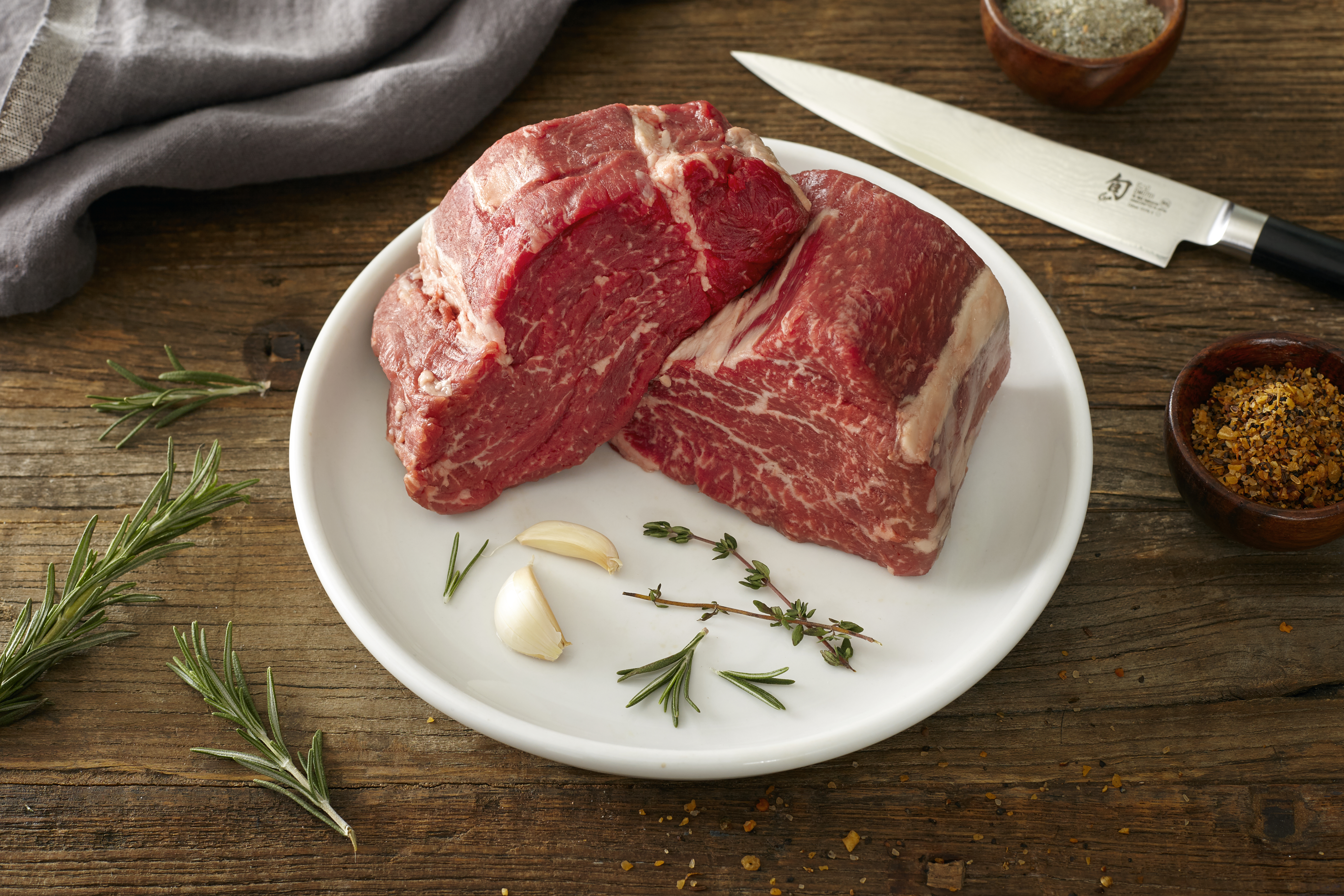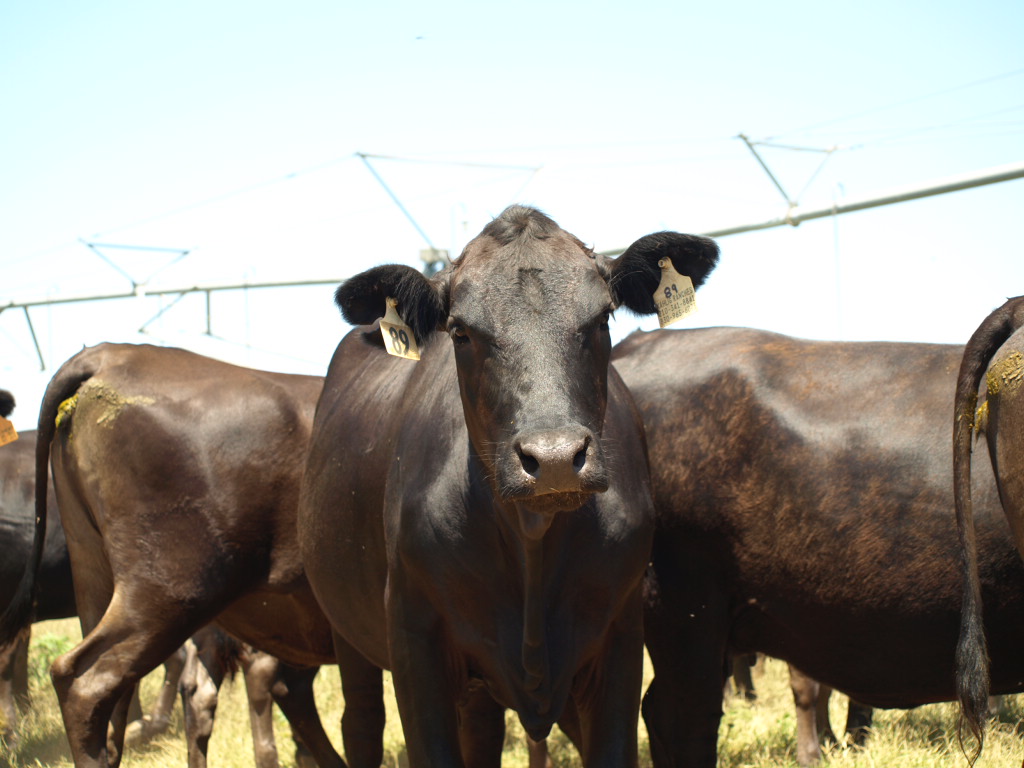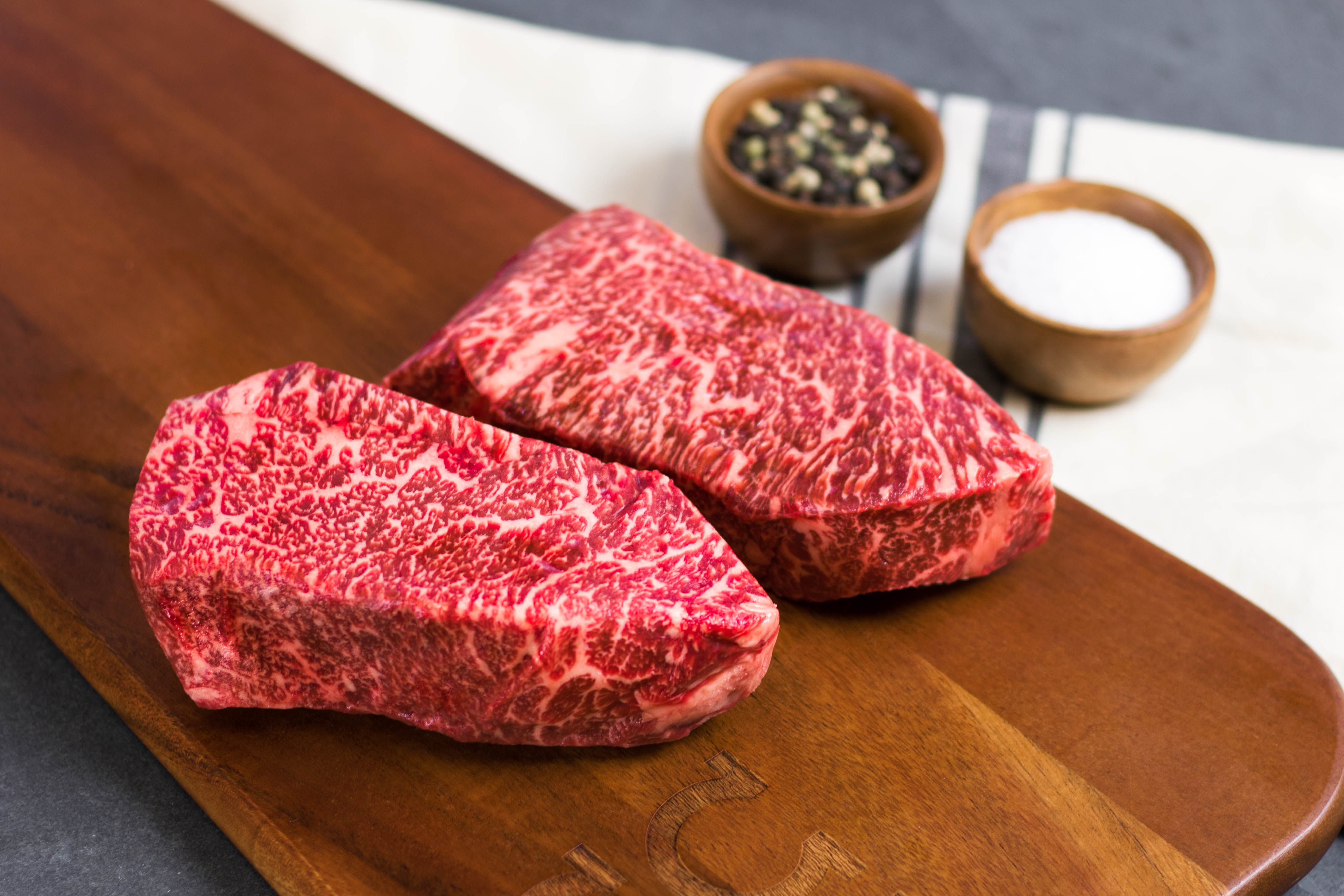
Raw Wagyu from Pacific Rogue Cattle Company
So what's the deal with Wagyu? The word itself means "Japanese cow" and is the name given to cattle breeds developed in Japan. There are four breeds of Japanese cattle that can be called Wagyu, but the Kuroge-washu breed, or Japanese Black, stands apart for its genetic predisposition to create finely grained marbling. The Kuroge-washu breed comprises 90% of cattle in Japan.
Other than its incredible flavor, extreme tenderness, and being insanely appetizing, the Kuroge-washu breed is incredibly friendly with great maternal instincts and we can trace its geneaology back to Japan. Still, genetics are only one factor behind great-tasting beef and different regions, feeds, ranching practices—just as a few examples—create variation in beef.
There's a lot that goes into researching domestic Wagyu ranches like Gypsum Valley Wagyu Cattle Company and Hutterian Wagyu, as well as newcomers Omega Beef, Tebben Ranches, and Kahlig Ranches. Not only do we visit the farms to see how the animals live, but we also track their lineage. That's how we know that Tebben Ranches offers Fullblood Wagyu whereas Gypsum Valley offers Purebred Wagyu.
The herd at Kahlig Ranches
Wait, you might be asking yourself, what's the difference between Fullblood and Purebred Wagyu cattle raised domestically? About 7% of their genetics. That slight difference in genetic tissue may very well impact the beef itself and provide a place of comparison for Wagyu aficionados. Due to Japan's historic export ban on cattle (which remains in effect, indefinitely, even as meat exports to the USA resumed in 2012), there just aren't a lot of Kuroge-washu cattle in the United States so the breeding programs are carefully tracked and cattle are registered to confirm authenticity.
Fullblood Wagyu are 100% traceable to Japanese herds with no evidence of crossbreeding. These cattle are the offspring of a bull and cow whose forebears originate from Japan.
Purebred Wagyu contains more than 93.75% pure Japanese Wagyu genetics. These cattle result from a Fullblood bull and a crossbred cow. Ed Gross of Hutterian Farms raises Purebred Wagyu in addition to the Hutterites' Angus herd.
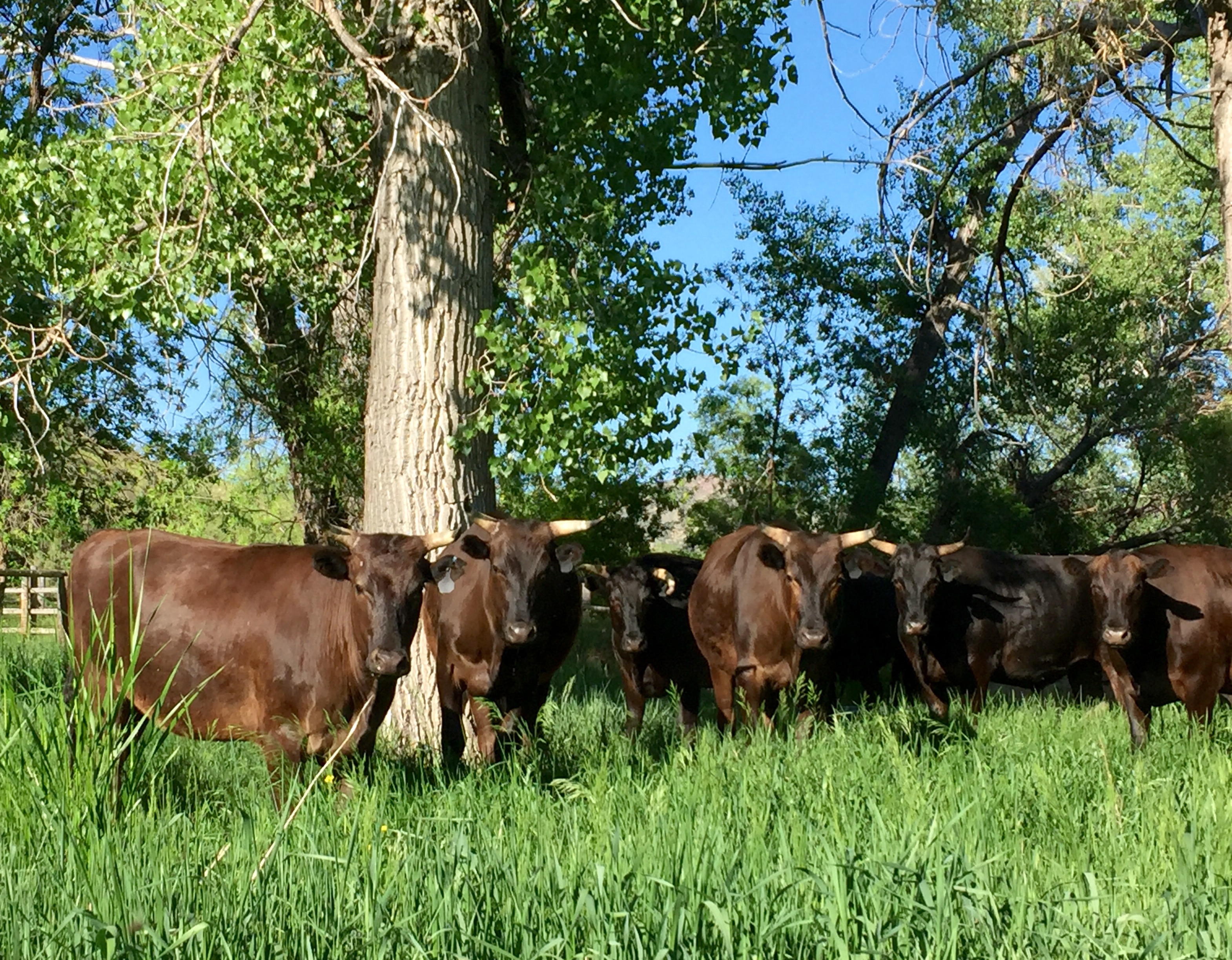
Wagyu herd at Omega Beef
The percentage difference is fairly minimal at that level of purity, particularly in comparison to a crossbred with 50% or less Kuroge-washu genetics. Let me put it this way, the closer to 100% Kuroge-washu, the more you'll taste the sweet umami flavors associated with the breed. Provided that the animal has been raised calmly and with plenty to eat, the better you'll see and experience its signature marbling. So if it tastes great, does the lineage matter? Well, maybe.
Those sweet umami flavors are indicative of real Wagyu. From Japanese A5 to domestic-raised purebred and fullblood, you'll recognize these unique flavors from the very first bite. In contrast, beef from crossbred Wagyu-Angus varieties never have that umami kick. Instead, that beef carries robust Angus flavors. That's why we say Wagyu-Angus cross are "Angus, elevated" since that beef features elements from each breed but not that signature Wagyu flavor profile.
Larry Tebben of Tebben Ranches has been raising Wagyu cattle for the past 12 years and determines that the breeding process and good genetics can have a huge impact on the herd. He shares, "The very first cattle we got were a high Tajima bloodline and the mother cows noticed their calves were smaller and not as sturdy in the Texas heat, so we started breeding for maternal traits using genetics from Shin-Omi and Kedaka Wagyu."
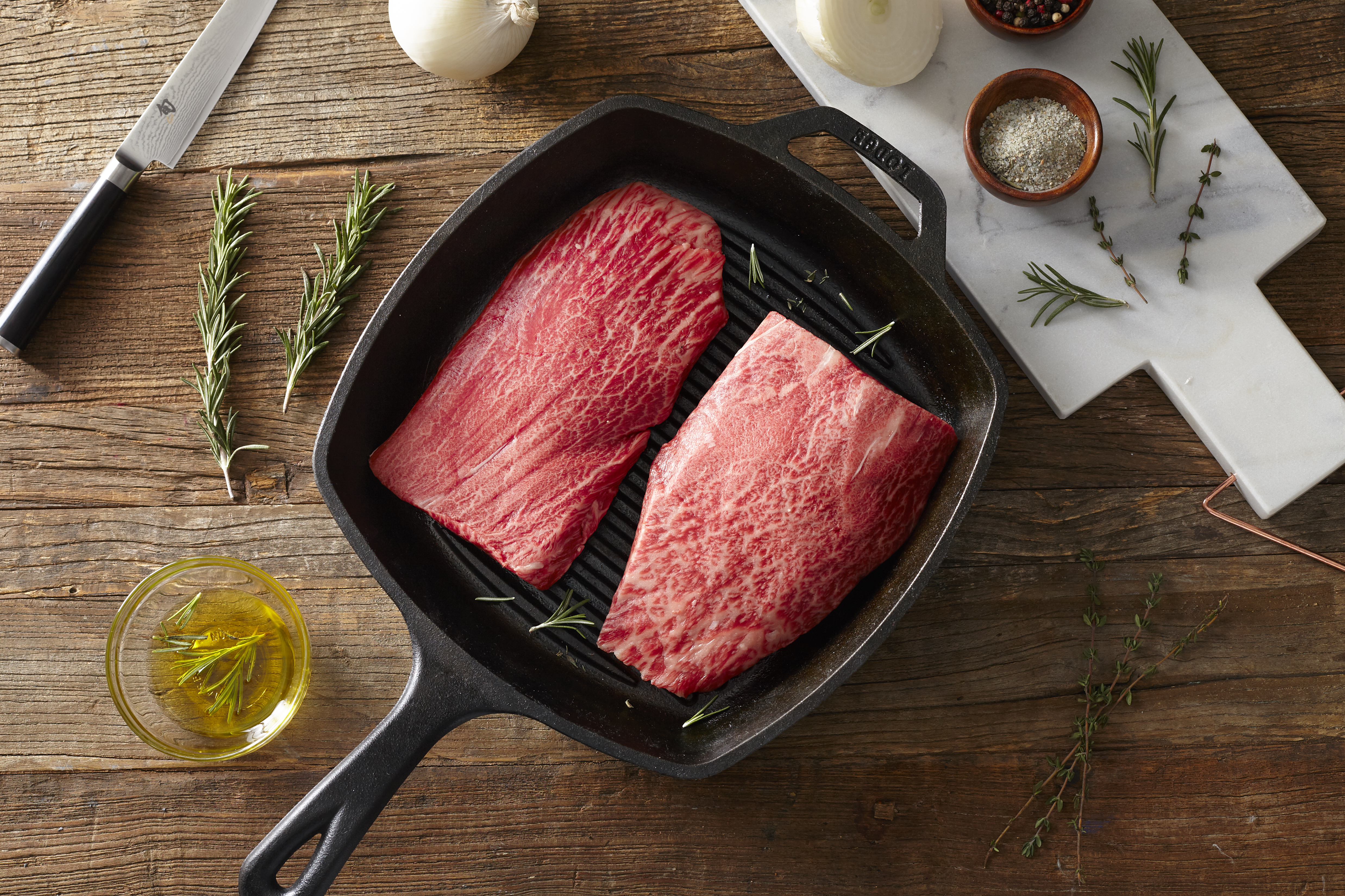
Wagyu Flat Iron
As I've discovered in talking to these farmers, people are drawn to Wagyu for a lot of reasons but often there's a health concern involved. “We look for healthy traits,” says Tina Kahlig of Kahlig Ranches. “The fat in Wagyu cattle is healthier, more like olive oils, and that’s very important to us. When you taste it and see the marbling, you can taste the difference. And the fact that we know where it’s coming from, that makes a difference too.”
Research on Kuroge-washu cattle at Texas A&M University and for Korean Journal for Food Science of Animal Resources indicates that the increased levels of monounsaturated fatty acids "are heart-healthy dietary fat that can lower LDL-cholesterol and increase HDL-cholesterol." The more favorable Omega-3s and higher levels of oleic acids in Wagyu beef are associated with positive cardiovascular health. That's why so many ranchers switch to Wagyu beef.
Different farmers follow different ranching protocols, but raising Purebred and Fullblod Wagyu generally means that ranchers will follow specific practices for their Wagyu herd. The hard work that goes into raising a specific breed like Wagyu really demonstrates how these ranchers are the epitome of craft beef.
